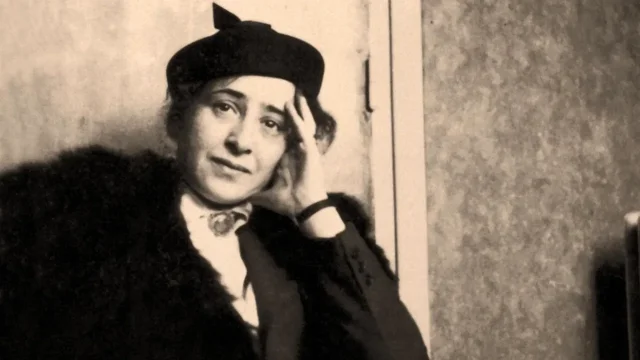Hannah Arendt is a name that echoes through the intellectual history of the 20th century. A German-Jewish political theorist who fled the horrors of Nazism, she grappled with the darkest events of her time through powerful and often controversial works. With revolutionary concepts like the “banality of evil,” she forced the world to rethink the nature of power, morality, and humanity itself. But was this formidable thinker a true genius? This exploration delves into her life, her most challenging ideas, and her enduring legacy.
Table of Contents
📖 Totalitarianism and the Banality of Evil
Arendt’s work is inseparable from the historical catastrophes she witnessed. She sought to understand the moral collapse that Nazism induced in European society, affecting perpetrators and victims alike. Her most significant contributions include:
- The Origins of Totalitarianism (1951): An examination of how totalitarian regimes rise and establish a “right to kill” by inverting all traditional values of morality, reason, and law.
- The Human Condition (1961): A philosophical investigation into the fundamental activities of human life: labor, work, and action.
- Eichmann in Jerusalem (1963): Her report on the trial of a high-ranking Nazi official, which introduced her most famous concept: the “banality of evil.”
Arendt argued that immense evil isn’t always committed by fanatical monsters. Instead, it can be carried out by ordinary people who abdicate their capacity to think. She saw Adolf Eichmann not as a diabolical mastermind, but as a “high functionary of extermination”—a mediocre bureaucrat motivated by obedience and a chilling lack of moral conscience. For Arendt, these thoughtless executors are the true enablers of criminal systems.
✡️ A Jewish Identity in a Broken Europe
Arendt’s Jewishness was a factual part of her life she never wished to change. In a famous 1963 letter to the scholar Gershom Scholem, who criticized her for a perceived lack of “love for the Jewish people,” Arendt retorted that she loved only her friends, not abstract groups. She argued that loving the Jewish people simply because she was Jewish would be suspect. She saw herself as a “daughter of our people” by fact, not by ideology. This perspective shaped her admiration for intellectuals like Rosa Luxemburg, whom she saw as “true Europeans” whose homeland was Europe itself, not a single nation-state.
💔 Philosophy, Love, and Betrayal
Educated in the great German philosophical tradition of Husserl and Jaspers, Arendt’s life was profoundly marked by her relationship with her teacher and lover, Martin Heidegger. She differentiated between the hostility of an enemy and the shock of being betrayed by a friend. Heidegger’s decision to support the Nazi regime in 1933 was a deep personal and intellectual blow. This experience of betrayal by someone she loved and admired informed her understanding of moral failure. Though she engaged with German philosophy throughout her life, she never felt she fully resolved her critique, leading her to identify as a political theorist rather than a philosopher.
🇺🇸 The American Experiment and “Public Happiness”
After escaping to the United States, Arendt became a keen observer of American political society. She drew a sharp distinction between the American and French Revolutions. She saw the French Revolution as tragically burdened by social questions and the struggle for subsistence. In contrast, she viewed the American Revolution as a successful political event that created a space for freedom and what she called “public happiness”—the joy of participating in public discourse. She admired the resilience of the American system, especially during the Watergate scandal, and championed the power of civil disobedience and dissent as essential components of a healthy democracy.
✨ The Force of Her Personality
Those who knew Arendt described a woman of “imperious” thought and formidable presence. She was direct, forceful, and possessed a sharp sense of humor with no false humility. Her public speaking was said to have the theatrical gravitas of a Greek actor, embodying an “drama of the spirit.” Her conversations were spontaneous, rigorous, and filled with a joyous freedom. She saw the university as a bastion for truth and was deeply influenced by the student movements of her time.
🤔 The Enduring Arendt Enigma
Hannah Arendt remains a paradoxical figure. She was a political theorist far ahead of her time, yet as a philosopher, she declared her hostility toward the modern world. Her work continues to challenge, provoke, and illuminate. It pushes us beyond simple historical analysis to a deeper political understanding of our world. As the Greek playwright Sophocles wrote, the city—the “space of free exploits of man and his living words”—is what gives splendor to life. For Arendt, thinking and acting in that public space was everything.
- Žižek on Trump: Politics as Hardcore Pornography
- How Later Thinkers Used Plato’s Mythic Tradition
- How to Interpret the Myth of Er in Plato’s Republic
- How to Understand the Myth of Atlantis as a Political Allegory
- How to Understand Plato’s Use of Myths in Political Philosophy
- How to Analyze the ‘Noble Lie’ in Plato’s Republic
- Hannah Arendt: Who Asked You to Believe?
